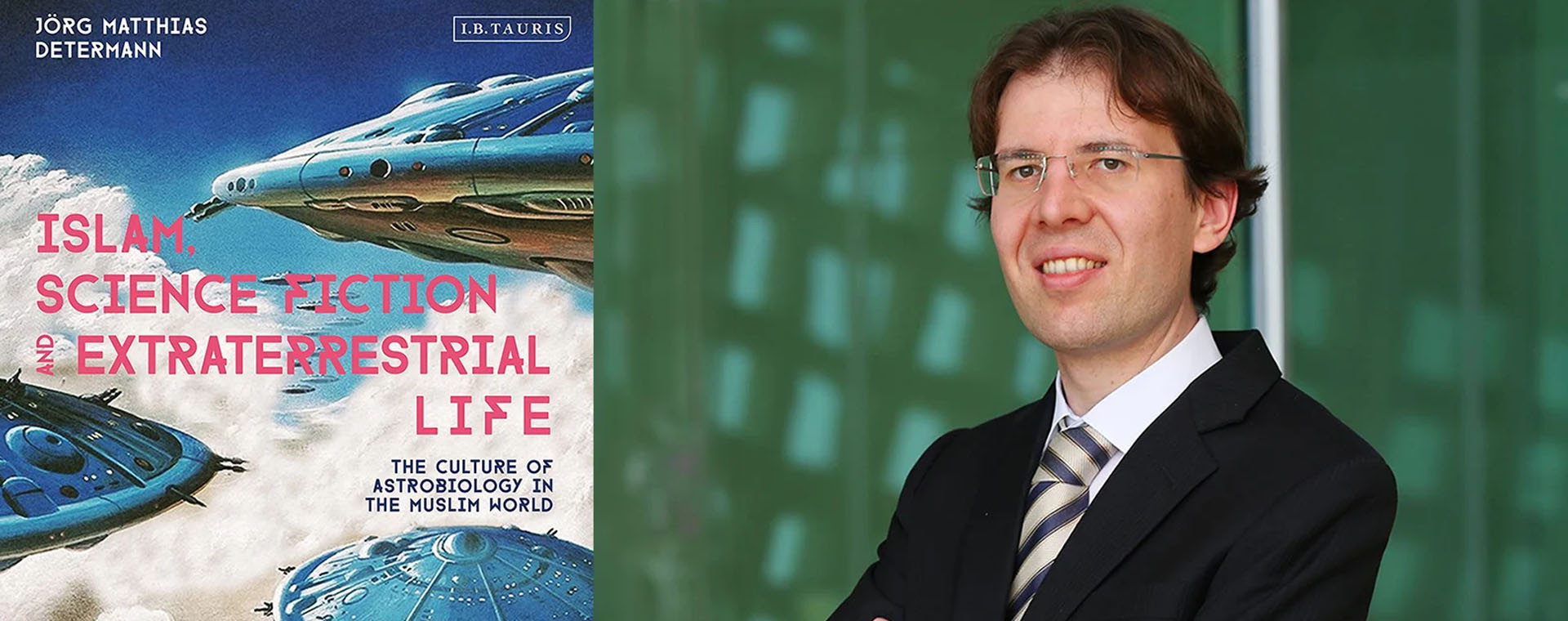PUBLISHED
July 02, 2023
KARACHI:
To modern eyes, both outside and within the Muslim world, science fiction fantasy and Islam don’t seem to have too much in common. Commentators in the West obsessed with demarcating a clear East-West divide in culture and ideology have long stereotyped Islamic thought and Muslims as being obsessed with the past and lacking in imagination and creativity.
But Islamic tradition, in fiction and beyond, has a rich history of exploring and embracing speculative ideas. In his though-provoking book ‘Islam, Science Fiction and Extraterrestrial Life’, historian Dr Jörg Matthias Determann aims to emphasise just that.
The Express Tribune sat down with Dr Determann for an interview about the assumptions he challenges with his book and the historic and modern futurism that he says flourishes in the Muslim world.
ET: How did this book came about? What specifically triggered your interest in this topic?
JMD: Since I was a child, I’ve been interested in a lot of speculative, imaginary worlds. I loved science fiction films, television series, visual games growing up. I’ve been a fan of Star Trek, Star Wars, and also other speculative fiction and fantasy worlds, like World of Warcraft, Harry Potter or Lord of the Rings.
I also like speculative fiction products from the Arab and Muslim world – One Thousand and One Nights, I watched at Disney’s Aladdin as a child.
Of course, at that age I did not know how all of these worlds were connected with one another. But since then I’ve learned that the One Thousand and One Nights influenced a lot of Western fantasy and a lot of Western science fiction. And while it’s often called Arabian Nights in English, a lot of these stories come from the broader Indian Ocean world – from Iran and the area of Pakistan and India as well.
For the last 10 years I’ve been living in Qatar in the Middle East, in the Gulf, which is of course part of this Indian Ocean world. And I’ve been just fascinated, for instance, by the futuristic architecture of places like Doha or Dubai, where you feel that you are in a city of the future. I read that Muhammad bin Salman, the Crown Prince of Saudi Arabia, is a fan of Blade Runner and likes that aesthetic. There have been a lot of futuristic mega projects in Saudi Arabia, Qatar and the United Arab Emirates, where people have been trying to build things that seemed impossible, like the tallest building. Being surrounded by all these imaginative futuristic projects has definitely inspired me to look at science fiction, futurism and futuristic imagination in the Muslim world.
ET: The introduction to the book mentions that the lack of science fiction is incorrectly attributed by many outside observers to ‘backward thinking’ and restrictions. While researching, what is something you found that challenges prevalent perceptions and stereotypes of Muslims and the Islamic World?
JMD: The Muslim world has many countries that are not democracies, that are autocratic and at times very repressive regimes as well, and this is what Western commentators have often focused on. In countries like Iran, Saudi Arabia, Syria or Egypt, Western media also holds the idea that Islam is a very conservative religion, and that many Muslims are very conservative, past-oriented and focused on tradition.
Many Western commentators didn’t think about Islam as a religion of the future and they didn’t necessarily see many Muslims as very future-oriented. But they didn’t focus as much on the possibilities.
What I wanted to show in my book was that despite these Western views, the Muslim world has produced many future-oriented, innovative, creative, imaginative, speculative minds who have created and imagined all kinds of worlds that have existed despite the repression, or sometimes because of the repression. Sometimes, there is censorship but that control might actually encourage people to be extra creative and imaginative.
ET: Extremist Islamic movements are often viewed as anachronisms in the modern world, but many researchers and historians have reframed it as a reaction to the latter. Do you find it ironic that traditionalism could be seen as a symptom of modernity?
JMD: Yes, I absolutely agree. Take Salafism – the idea that you would go back to using the Salaf, the first generation of Muslims, as a source or as role models – it is a modern movement in itself and it is a movement that uses modern technology. Salafis are using mobile phones and satellite networks, YouTube and social media and so on.
So, definitely some of these traditionalist voices in the Muslim world are often deeply modern in how they emerge and how they operate.
ET: Many writers, particularly in the West, have tried to create a clear historical and ideological boundary between the ‘East and West’. But historical research illustrates how interconnected the entire Old World was and how many ideas flowed back and forth. What are your thoughts on this with regards to fiction?
JMD: I love talking about connections and exchanges rather than divisions. I mentioned earlier how some speculative fiction has been connected as a type of world literature. Jules Verne, for instance, was inspired by the One Thousand and One Nights and even the entire Western European novel format, owes a lot of debt to eastern traditions of storytelling and folk tales, etc.
But if you look at films in the area of science fiction as well, like Star Wars, they combine a lot of western themes and traditions with eastern ones. The first movie in the Star Wars series shows us a desert planet, which is a trope that also appears in the Dune novels.
You can also talk about colonialism, extraction of resources, resistance to colonialism, empire, imperialism – these are big themes in both Dune and Star Wars. These are some of the richest, most fascinating bodies of world cinema and literature that are not just western, but global in their sources, inspiration and contributions. They bring different cultures, different knowledge from different parts of the world together in order to create something new that is interesting and that resonates with the broad population.
ET: Fiction aside, what are your views on speculative ideas, like the possibility of extra-terrestrial life, within Islamic religious and philosophical thought?
JMD: Islam is a very open and encouraging religion when it comes to the imagination and speculation as well. The Quran mentions worlds in plural, for instance. It states several times that Allah is the Lord of the Worlds – the plural ‘alameen’ is used, the singular ‘alam’ never appears. So the Quran itself encourages people to imagine what kind of worlds there might be.
It is repeatedly, of course, stated that God is omnipotent, that he is all powerful, that he can create whatever he wants. So it is perfectly within an Islamic frame to imagine all kinds of possible worlds created by God, and that the creation of these worlds would all add to the glory of God Himself.
There are also other forms of intelligent beings discussed in the Quran and in the Hadith. Angels, like in Christian tradition, and in the Islamic tradition specifically, there is the strong belief in the Jinn as well. These would be intelligent creatures who are somewhat extra-terrestrial in that they can come to our world, but they can also exit our world. There is the idea that also the Jinn might have their own world. They are seen as creatures of a different nature, made of fire where humans are made of clay. So, a different kind of material nature and material reality. But like humans, they can end up in paradise or they can end up in hell, implying they are rational beings. There is a lot of philosophical engagement in the Islamic tradition with the nature of the Jinn. In that sense, science fiction and broadly speculative fiction into the fantasy can receive a lot of inspiration from Islam and from the Quran itself.
ET: Coming to South Asia, what influence from the region on wider speculative fiction in the Islamic World did you find?
JMD: South Asia has incredibly rich heritage in terms of speculative fiction. I mentioned One Thousand and One Nights earlier – the tales it contains are seen as Arabian, but they often make reference to broader geographies, from South Asia to Africa. Take for instance the mention of elephants in One Thousand and One Nights – there are no elephants in the Arabian Peninsula so these would be either North African or Indian elephants.
The tales of Sinbad the sailor make up part of One Thousand and One Nights, and these are stories about the fantastic islands and coasts that traders used for thousands of years. So, we have this incredibly rich, well, heritage of stories.
In the modern area, South Asia continued to be the crossroad of cultures, where you have colonial invaders like the Portuguese, the British and the French meeting with various locals and traders from Africa, the Arabian Peninsula, etc., bringing just a lot of material ideas, people and goods, thoughts together, just creating something very dynamic and something very rich.
We do obviously have in South Asia a very productive industry and all kinds of things that are imaginative and creative. A huge industry producing books and of course a huge industry producing movies. While Pakistan’s film industry doesn’t have quite the size of Bollywood, it has too produced science fiction. One very important such film from Pakistan is Shaani, which was produced in 1989. The story follows an alien who comes to earth and falls in love with a human woman, creating a complicated love story that is a hallmark of many other films from South Asia.















































